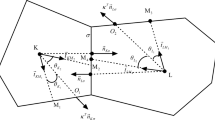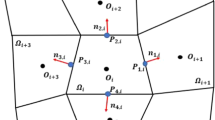Abstract
In this paper, a nonlinear finite volume scheme preserving the discrete maximum principle for the anisotropic diffusion equation on distorted meshes is described. We prove the coercivity of the scheme under some constraints on the cell deformation and the diffusion coefficient. Numerical results show that the scheme is indeed coercive and satisfies the discrete maximum principle, and the accuracy of this scheme is remarkably better than that of an existing scheme preserving the discrete maximum principle on random triangular meshes.
Similar content being viewed by others
References
Angelini O, Chavant C, Chenier E, et al. A finite volume scheme for diffusion problems on general meshes applying monotony constraints. SIAM J Numer Anal, 2010, 47: 4193–4213
Bertolazzi E, Manzini G. A second-order maximum principle preserving finite volume method for steady convection-diffusion problems. SIAM J Numer Anal, 2005, 43: 2172–2199
Blanc X, Labourasse E. A positive scheme for diffusion problems on deformed meshes. ZAMM Z Angew Math Mech, 2016, 96: 660–680
Burdakov O, Kapyrin I, Vassilevski Y. Monotonicity recovering and accuracy preserving optimization methods for postprocessing finite element solutions. J Comput Phys, 2012, 231: 3126–3142
Burman E, Ern A. Discrete maximum principle for Galerkin approximations of the Laplace operator on arbitrary meshes. C R Acad Sci Ser I Math, 2004, 338: 641–646
Camier J S, Hermeline F. A monotone nonlinear finite volume method for approximating diffusion operators on general meshes. Internat J Numer Methods Engrg, 2016, 107: 496–519
Cances C, Cathala M, Le Potier C. Monotone corrections for generic cell-centered finite volume approximations of anisotropic diffusion equations. Numer Math, 2013, 125: 387–417
Chang L, Sheng Z, Yuan G. An improvement of the two-point flux approximation scheme on polygonal meshes. J Comput Phys, 2019, 392: 187–204
Chang L, Yuan G. Cell-centered finite volume methods with flexible stencils for diffusion equations on general nonconforming meshes. Comput Methods Appl Mech Engrg, 2009, 198: 1638–1646
Drăgănescu A, Dupont T F, Scott L R. Failure of the discrete maximum principle for an elliptic finite element problem. Math Comp, 2004, 74: 1–23
Droniou J. Finite volume schemes for diffusion equations: Introduction to and review of modern methods. Math Models Methods Appl Sci, 2014, 24: 1575–1619
Droniou J, Le Potier C. Construction and convergence study of schemes preserving the elliptic local maximum principle. SIAM J Numer Anal, 2011, 49: 459–490
Friis H A, Edwards M G. A family of MPFA finite-volume schemes with full pressure support for the general tensor pressure equation on cell-centered triangular grids. J Comput Phys, 2011, 230: 205–231
Gao Z, Wu J. A small stencil and extremum-preserving scheme for anisotropic diffusion problems on arbitrary 2D and 3D meshes. J Comput Phys, 2013, 250: 308–331
Gao Z, Wu J. A second-order positivity-preserving finite volume scheme for diffusion equations on general meshes. SIAM J Sci Comput, 2015, 37: A420–A438
Hoteit H, Mose R, Philippe B, et al. The maximum principle violations of the mixed-hybrid finite-element method applied to diffusion equations. Internat J Numer Methods Engrg, 2002, 55: 1373–1390
Huang W. Discrete maximum principle and a Delaunay-type mesh condition for linear finite element approximations of two-dimensional anisotropic diffusion problems. Numer Math Theory Methods Appl, 2011, 4: 319–334
Huang W, Wang Y. Discrete maximum principle for the weak Galerkin method for anisotropic diffusion problems. Commun Comput Phys, 2015, 18: 65–90
Jameson A. Analysis and design of numerical schemes for gas dynamics, 1: Artificial diffusion, upwind biasing, limiters and their effect on accuracy and multigrid convergence. Int J Comput Fluid Dyn, 1995, 4: 171–218
Le Potier C. Finite volume monotone scheme for highly anisotropic diffusion operators on unstructured triangular meshes. C R Acad Sci Ser I Math, 2005, 341: 787–792
Le Potier C. A nonlinear finite volume scheme satisfying maximum and minimum principles for diffusion operators. Int J Finite Vol, 2009, 6: 1–20
Li D, Shui H, Tang M. On the finite difference scheme of two-dimensional parabolic equation in a non-rectangular mesh. Chinese J Numer Methods Comput Appl, 1980, 4: 217–224
Lipnikov K, Manzini G, Svyatskiy D. Analysis of the monotonicity conditions in the mimetic finite difference method for elliptic problems. J Comput Phys, 2011, 230: 2620–2642
Lipnikov K, Shashkov M, et al. Monotone finite volume schemes for diffusion equations on unstructured triangular and shape-regular polygonal meshes. J Comput Phys, 2007, 227: 492–512
Lipnikov K, Svyatskiy D, Vassilevski Y. Interpolation-free monotone finite volume method for diffusion equations on polygonal meshes. J Comput Phys, 2009, 228: 703–716
Lipnikov K, Svyatskiy D, Vassilevski Y. A monotone finite volume method for advection-diffusion equations on unstructured polygonal meshes. J Comput Phys, 2010, 229: 4017–4032
Lipnikov K, Svyatskiy D, Vassilevski Y. Minimal stencil finite volume scheme with the discrete maximum principle. Russian J Numer Anal Math Modelling, 2012, 27: 369–385
Liska R, Shashkov M. Enforcing the discrete maximum principle for linear finite element solutions of second-order elliptic problems. Commun Comput Phys, 2008, 3: 852–877
Lu C, Huang W, Qiu J. Maximum principle in linear finite element approximations of anisotropic diffusion-convection-reaction problems. Numer Math, 2014, 127: 515–537
Lu C, Huang W, Van Vleck E. The cutoff method for the numerical computation of nonnegative solutions of parabolic PDEs with application to anisotropic diffusion and lubrication-type equations. J Comput Phys, 2013, 242: 24–36
Nordbotten J, Aavatsmark I, Eigestad G. Monotonicity of control volume methods. Numer Math, 2007, 106: 255–288
Queiroz L, Souza M, Contreras F, et al. On the accuracy of a nonlinear finite volume method for the solution of diffusion problems using different interpolations strategies. Internat J Numer Methods Fluids, 2014, 74: 270–291
Schneider M, Agelas L, Enchery G, et al. Convergence of nonlinear finite volume schemes for heterogeneous anisotropic diffusion on general meshes. J Comput Phys, 2017, 351: 80–107
Sheng Z, Yuan G. A nine point scheme for the approximation of diffusion operators on distorted quadrilateral meshes. SIAM J Sci Comput, 2008, 30: 1341–1361
Sheng Z, Yuan G. The finite volume scheme preserving extremum principle for diffusion equations on polygonal meshes. J Comput Phys, 2011, 230: 2588–2604
Sheng Z, Yuan G. A new nonlinear finite volume scheme preserving positivity for diffusion equations. J Comput Phys, 2016, 315: 182–193
Sheng Z, Yuan G. Construction of nonlinear weighted method for finite volume schemes preserving maximum principle. SIAM J Sci Comput, 2018, 40: A607–A628
Terekhov K, Mallison B, Tchelepi H. Cell-centered nonlinear finite-volume methods for the heterogeneous anisotropic diffusion problem. J Comput Phys, 2017, 330: 245–267
Wang J, Zhang R. Maximum principles for P1-conforming finite element approximations of quasi-linear second order elliptic equations. SIAM J Numer Anal, 2012, 50: 626–642
Wang S, Yuan G, Li Y, et al. Discrete maximum principle based on repair technique for diamond type scheme of diffusion problems. Internat J Numer Methods Fluids, 2012, 70: 1188–1205
Yuan G. Diffusion schemes satisfying extremum principle on non-orthogonal meshes (in Chinese). Math Numer Sin, 2021, 43: 1–16
Yuan G, Sheng Z. Monotone finite volume schemes for diffusion equations on polygonal meshes. J Comput Phys, 2008, 227: 6288–6312
Yuan G, Yu Y. Existence of solution of a finite volume scheme preserving maximum principle for diffusion equations. Numer Methods Partial Differential Equations, 2018, 34: 80–96
Zhou H, Sheng Z, Yuan G. A conservative gradient discretization method for parabolic equations. Adv Appl Math Mech, 2021, 13: 232–260
Acknowledgements
This work was supported by National Natural Science Foundation of China (Grant Nos. 12071045 and 11971069), the Foundation of CAEP (China Academy of Engineering Physics) (Grant No. CX20210042) and the Foundation of LCP (Laboratory of Computational Physics).
Author information
Authors and Affiliations
Corresponding author
Rights and permissions
About this article
Cite this article
Sheng, Z., Yuan, G. Analysis of the nonlinear scheme preserving the maximum principle for the anisotropic diffusion equation on distorted meshes. Sci. China Math. 65, 2379–2396 (2022). https://doi.org/10.1007/s11425-021-1931-3
Received:
Accepted:
Published:
Issue Date:
DOI: https://doi.org/10.1007/s11425-021-1931-3




